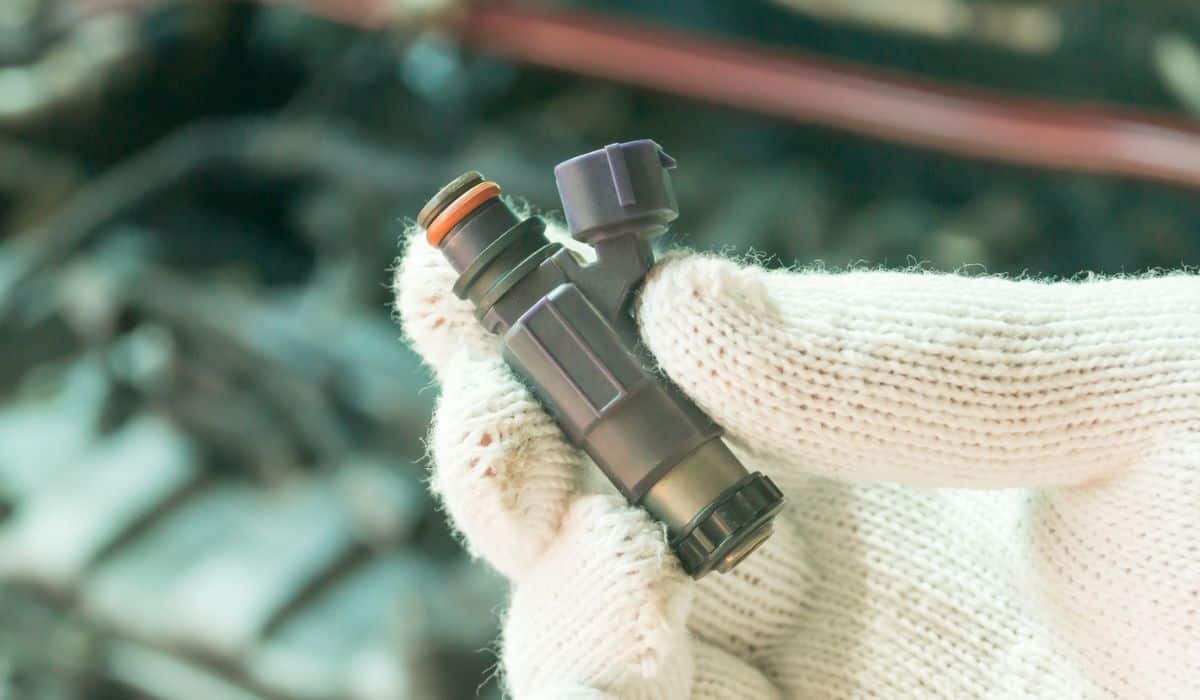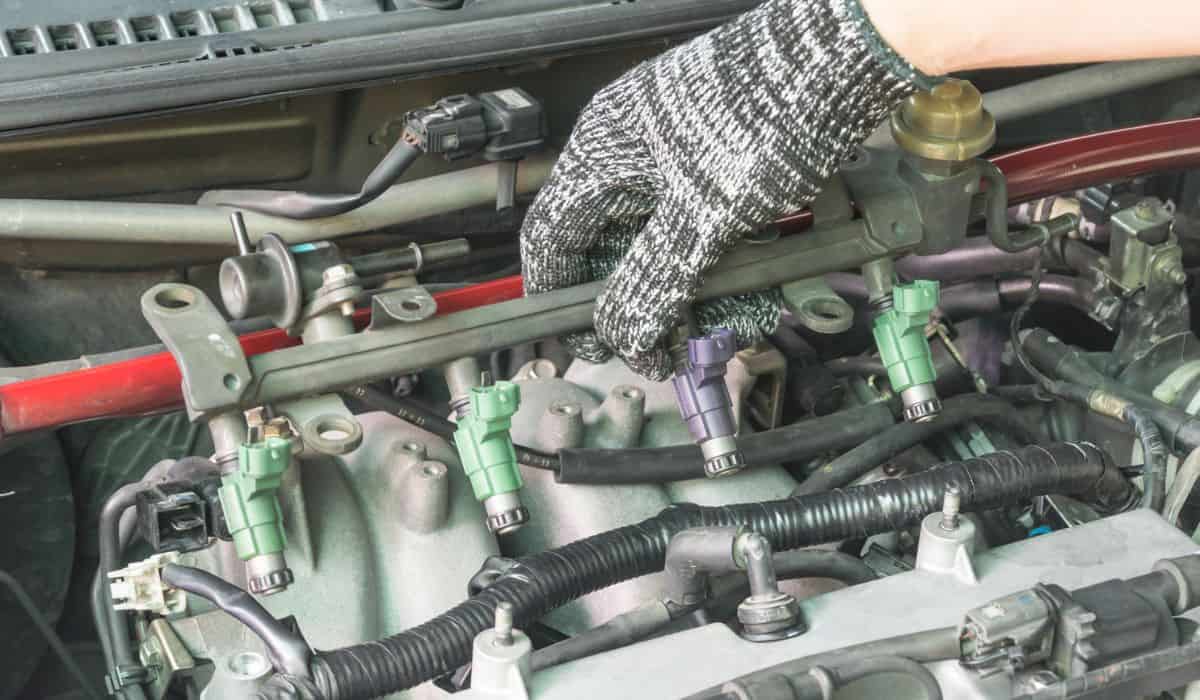Do Fuel Injectors Have Polarity? Explained!
Performance issues decrease fuel efficiency, and rough handling warrants new fuel injectors. But if you’re replacing your worn-out injectors, you may need to know if they have positive and negative polarity.
Fuel injectors are solenoid valves and do not have polarity. Therefore, the wiring is not dependent on positive or negative ends. Instead, one prong of the injector’s plug must be connected to the harness’s positive terminal and the other to the negative ground wire.
There’s much to consider when replacing and installing new vehicle components, like fuel injectors. As an essential part of the fuel system, it’s vital to get the installation correct. So, let’s take a deeper look at everything you need to know about fuel injector polarity and installation.
Do Fuel Injectors Have Polarity?

Fuel injectors like these (example on Amazon) are solenoid valves, which means they do not have negative or positive polarity.
“Solenoid” refers to a coil of wire that generates a magnetic field when electrical current travels through it. The magnetic energy from solenoid coils is used to regulate fluids, linear motion, plunger-type actuators, and more.
Solenoid valves are typically used to control fluids, like shutting off, releasing, dosing, distributing, or mixing fluids. For example, they may cause a piston to move or a valve to open. They’re fast, safe, reliable, and long-lasting.
How Do Fuel Injectors Work?
So, if fuel injectors are polarity-insensitive, how do they work? First, you’ll need to understand the fuel system in a vehicle.
Gasoline, or diesel, travels through fuel lines from the gas tank, the fuel filter, and finally into the fuel injectors. A vehicle will have one fuel injector for each cylinder in the engine—a V6 engine will have six fuel injectors, while a V4 will have four.
The fuel injectors have a nozzle with tiny holes that spray fuel into the cylinders. Modern injection systems atomize the fuel at high pressures, combining it with clean oxygen as it travels through the inlet manifold before moving into the combustion chamber in each cylinder.
Modern fuel injection systems are electronic and consist of computers, oxygen sensors, injectors, fuel pumps, and pressure gauges.
These systems ensure the correct ratio and gasoline delivery into the combustion chamber. However, the Electronic Control Unit (ECU) does most of the work regarding controlling fuel flow.
Is it Possible to Wire Fuel Injectors Backward?
Wiring new fuel injectors backward is one reason you might ask if they have positive or negative ends.
In some applications, the wiring harness will have a “+” and “-” marking to signify the positive or negative polarity. But fuel injectors don’t need to line up with positive and negative ends.
Instead, ensure that one prong of the injector’s plug is connected to the wiring harness’s positive terminal and the other to the negative ground wire. This will allow electrical current to interact with the magnetic coil, allowing the injector to work correctly.
What Happens If You Cross Fuel Injector Wires?
Fuel injector wiring isn’t dependent on polarity, so it’s not likely you can cross the wires. Instead, one prong of the injector’s plug must be connected to the harness’s positive terminal and the other to the negative ground wire.
If you install them like this, electricity will travel through the magnetic coil, allowing it to function correctly.
What Causes Fuel Injector Failure?

Although fuel injectors are incredibly durable and can last between 70,000 and 100,000 miles, they can still break down or fail. As a result, you’ll notice significant performance issues when your fuel injectors start to go bad or become clogged.
Common Symptoms of Fuel Injector Failure
The fuel injectors are an essential component of a vehicle’s fuel system, and you’ll notice issues if they start to fail. Some of the most common symptoms of fuel injector failure include the following:
- Rough idling
- Engine misfire
- Lurching
- Decreased fuel efficiency
- Thick black smoke from the tailpipe
- Check engine light comes on the dashboard
- Loss of power and performance issues
It’s essential to deal with these issues as soon as they arise to avoid permanent damage to your vehicle and hefty repair fees. But what causes fuel injector failure anyways?
Cause 1: Poor Fuel Quality
Low-quality fuel is one of the primary culprits behind fuel injector failure and clogged injectors. Gasoline with excess debris, by-products, and impurities can plug fuel injectors over time, causing them to lose efficiency.
These issues are more common in areas that use different fuels depending on the season.
Cause 2: Heat Soak
“Heat soak” refers to an issue where gasoline residue evaporates from the injector nozzle after you turn off the engine.
The residue creates waxy olefins, which linger in the ports during idle and won’t wash away. Eventually, these by-products build up and harden into blockages.
Although fuel has detergents to remove this debris, heat soak may not provide your engine enough time to remove all the by-products. In these situations, the fuel injectors can become severely clogged and fail.
Cause 3: Solenoid Failure
Solenoids create magnetic fields to move the fuel injector system. As a result, the fuel injector can fail if there are openings, shortages, or issues with the solenoid. These issues may happen over time or due to external damage.
Cause 4: Engine Blow By
Engine blow-by refers to fuel and oil residue that travels past the pistons into the crankshaft during engine compression. A working PVC system in a car will pull the blow-by out.
However, the build-up can easily clog the fuel injectors if the air filter doesn’t capture it or the PVC system isn’t functional.
Cause 5: Broken and Leaking Injectors
Fuel injector failure can happen if the component is cracked, leaking, or worn out. Problems with the fuel injector don’t allow it to create the correct fuel and air ratio.
As a result, you’ll notice decreases in performance and other problems if the issue isn’t handled correctly.
Cause 6: Faulty ECU
Faulty Electronic Control Units (ECU) can also cause problems with the injector. Issues with the ECU can prevent the fuel injectors from working correctly and delivering the proper fuel/air ratio. If this is the case, you might notice performance issues and a check engine light on your dashboard.
